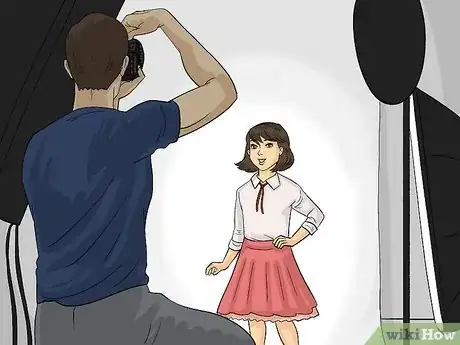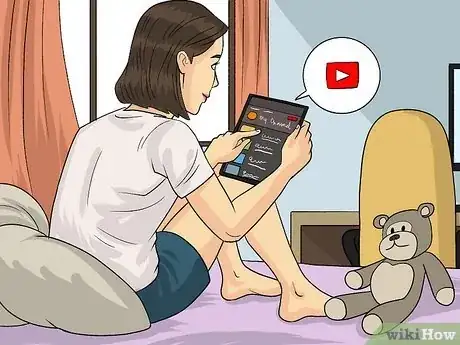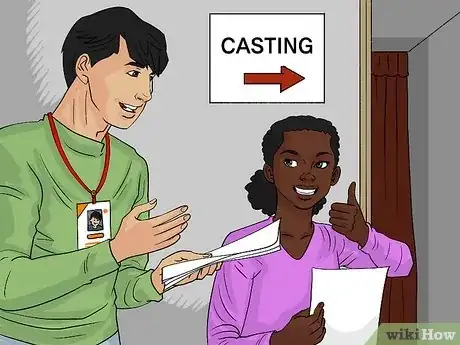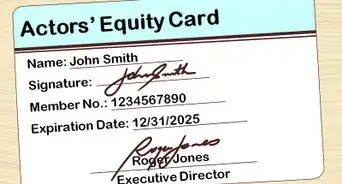This article was co-authored by Ben Whitehair. Ben Whitehair is a Social Media Expert and the Chief Operating Officer (COO) of TSMA Consulting. With over a decade of experience in the social media space, he specializes in leveraging social media for business and building relationships. He also focuses on social media’s impact on the entertainment industry. Ben graduated summa cum laude from The University of Colorado at Boulder with BAs in Theatre and Political Science as well as a Leadership Certificate. In addition to his work as CIO, Ben is a certified business and mindset coach and National Board Member of SAG-AFTRA. He is also a successful entrepreneur as the Co-Founder of Working.Actor, the premier business academy and coaching community for actors.
There are 7 references cited in this article, which can be found at the bottom of the page.
wikiHow marks an article as reader-approved once it receives enough positive feedback. This article received 87 testimonials and 85% of readers who voted found it helpful, earning it our reader-approved status.
This article has been viewed 505,932 times.
Do you love performing in front of an audience and dazzling a crowd? If so, you might be an actor at heart. There are all kinds of opportunities out there for child actors, but how do you get into the business? Don't worry—this article will walk you through everything you need to know to become a child actor, from developing your acting skills to getting an agent to acing your auditions.
Steps
Getting Started
-
1Take acting classes. While you may have natural talent, it always helps to hone your skills, so you’re well-prepared when you start to go on auditions. A school drama class is a good place to start, but specialized classes and workshops in specific acting areas, such as commercial acting or acting for the camera, are more impressive to list on your resume.[1]
- If you don’t have time during the school year to take acting classes, a summer drama camp may be a good alternative.
- If you want personalized acting instruction, you might talk to your parents about hiring an acting coach who can work with you one-on-one to improve your skills.
-
2Get some experience. While you probably won’t be able to get a professional acting job right out of the gate, you’ll want potential agents and casting directors to know that you have experience performing. Look for local opportunities to act (such as school plays, regional theater, and student films) so you have some roles to put on your resume.[2]
- Try to play a large variety of types of roles. Doing so will it give you an opportunity to stretch your acting skills and will also showcase your impressive acting range to casting directors.
- Don't think that you need to go to L.A. or New York in order to jumpstart your acting career. There are many other markets and opportunities out there that you can take advantage of. Although, L.A., New York and Chicago will likely give you more free range of roles, auditions and classes. [3]
Advertisement -
3Talk to your parents. If you’re under 18, you won’t be able to work as an actor without your parents’ permission, so it’s important to get them on board with your plans. Explain how much you enjoy acting, so they understand that it’s something you’re extremely passionate about. You may also need to reassure them that you won’t neglect your other responsibilities, such as school and chores, just because you’re pursuing acting. If it's something you're really passionate about, and you're parents aren't completely sure about it, but you don't want to quit, keep working on your skills, and when your confident enough show them how much it means. Talk about it as much as you can, and most likely you're parents will be happy to help you out! [4]
- Don’t tell your parents that you want to become an actor just because you want to be famous or rich. Have some good reasons ready, such as you love telling stories or have fun creating characters, so they’ll take you seriously.
Making Connections
-
1Get headshots. When you go to meet with potential agents and casting directors, you’ll need to provide a photo. They must be professional photos, though, so you should go to a photographer who specializes in taking photos of children and teens.[5] Make sure to ask for both commercial and theatrical headshots, so you’re ready for both advertising work and film, television, and theater opportunities.[6]
- It’s important to choose the right photographer for your headshots. Ask for recommendations if you have friends or acquaintances in the acting field. Otherwise, visit websites for photographers in your area, and study their online portfolios to get an idea of the quality of their work.
- Especially early in your acting career, a headshot that pops is important because it's a huge part of your acting portfolio.[7]
-
2Find an agent. While you may be able to book some small acting jobs with just your parents’ help, having an agent is crucial if you really want to build a successful acting career. Not only will an agent know the ins and outs of the business so they can guide you in the right direction, they’ll have connections with casting directors and producers that make it easier to get auditions.[8]
- To find an agent, research the top talent agencies in your area. You want to make sure that you’re working with a reputable agent, who doesn’t ask for any money upfront.
- Many talent agencies allow you to apply online. However, it’s a good idea to meet with a potential agent in person before you and your parents commit to working with them.
- If you live in a rural area where it's difficult to find an agent, that doesn't mean you can't act. It just means that you need to look for work through trade publications, such as Backstage, and online casting sites, so you can identify local acting opportunities.
- In some cases, agents won't take you on as a client until you have some professional acting credits to your name. You may want to find a few jobs on your own (or with your parents' help) before trying to land an agent.
-
3Get a work permit. If you’re under 18, many states require a permit to work in the entertainment industry. For example, California and New York, where many acting opportunities are available, have specific requirements that regulate how child actors may be used. Your agent should know the laws in your state, but you can also visit your state’s labor department website to find out if you need a permit in your state.[9]
- In most cases, a form is required to get a work permit. You’ll need to provide parental consent, as well as other information depending on the state. Your health and school records are usually required.
-
4Join online casting sites. While your agent will be on the lookout for acting opportunities that fit your skills, you can also do some research yourself. Sites such as Casting Frontier, Actors Access, and L.A. Casting provide casting and audition information for projects that are currently in the process of filling roles. You can usually submit yourself for consideration directly, but it's a good idea to discuss potential roles with your agent.[10]
- These sites usually charge a fee, so you’ll need to discuss joining them with your parents.
-
5Create a YouTube account. Whether you have an agent or not, it's important to find as many ways to market yourself as an actor as possible, especially if you don't live in L.A. or New York, where most acting opportunities are. Make videos for YouTube that demonstrate your acting skills -- there's no guarantee casting directors or agents will see your videos, but you never know when one will go viral.
- Videos of school play and regional theater performances are ideal content for your YouTube channel. Local commercials or TV appearances are also a good idea because agents or casting directors outside your area probably haven't seen them.
- If you're feeling creative, you can also post original short films that help showcase your acting ability.
Auditioning
-
1Prepare a monologue. While most auditions will have a specific scene or group of scenes that you are required to perform, you may sometimes be asked to come up with your own material. That’s why it’s a good idea to work on a monologue or two, so you’ll always be ready when an audition comes up. Make sure to choose a piece that really allows you to showcase your acting skills.[11]
- If you’re not sure what monologue(s) to prepare, consider some of your favorite movies -- there’s bound to be a piece in one of them that will work.
- It’s usually best to choose an age-appropriate monologue. If possible, find one that’s delivered by character who’s as close to you in age as possible.
- Try to master at least two monologues that tonally contrast with each other and also aren't too well-known or frequently performed. That way, you can showcase your acting range without automatically being compared to others.[12]
-
2Study the script or sides. In many cases, the casting company will send you a script or “sides,” which are just the portion of the script that pertain to the character that you’re reading for, in advance of the audition. Don’t just glance at your lines a couple of times to try to memorize them -- make an effort to understand the character and figure out the best way to play the scene.[13] [14]
- Many casting directors won’t mind if you hold your script or sides during your audition. However, it’s best if you don’t read directly from it. Instead, just glance at it occasionally to remind yourself of the lines.
-
3Treat it like work. If you really want an acting career, you must take every audition seriously. While you may not have a job yet, you should act like a professional, so the casting director is comfortable working with you. That means being open to any suggestions that he or she might make and being willing to do the scene several times to get it right.[15]
- Make sure to project confidence during your audition. If you don’t believe that you’re good enough for the part, the casting director probably won’t either.
-
4Don’t get discouraged. Acting is an extremely competitive business, even for children. As a result, you’re probably going to go on many auditions that don’t end in a job -- but that doesn’t mean you should lose faith in your skills as an actor. As with most things, practice makes perfect, so the more you audition, the better you’ll become at impressing casting directors.[16]
- If you realize at some point that you’re no longer having fun pursuing an acting career, talk to your parents. You shouldn’t keep at it if it only makes you feel bad about yourself. And maybe if you cant do these things at school then maybe start a little drama club for you and your friends!
Expert Q&A
-
QuestionCan you become an actor with no experience?
 Jim JarrettJim Jarrett is an Acting Teacher and the Founder of The Meisner Technique Studio based in San Francisco, California. With over 30 years of experience, he specializes in teaching The Meisner Technique and is Sanford Meisner's last teaching protégé. Over the years, Jim has established schools in Los Angeles, California, Hawaii, and Sun Valley, Idaho. He also travels the world annually as a guest teacher at universities, performing art schools, and theater companies throughout North America, Europe, and Asia. His flagship school is located in the heart of the Presidio in San Francisco, California.
Jim JarrettJim Jarrett is an Acting Teacher and the Founder of The Meisner Technique Studio based in San Francisco, California. With over 30 years of experience, he specializes in teaching The Meisner Technique and is Sanford Meisner's last teaching protégé. Over the years, Jim has established schools in Los Angeles, California, Hawaii, and Sun Valley, Idaho. He also travels the world annually as a guest teacher at universities, performing art schools, and theater companies throughout North America, Europe, and Asia. His flagship school is located in the heart of the Presidio in San Francisco, California.
Acting Teacher Yes, although do keep in mind that acting is considered one of the most competitive industries out there. You can get started gaining experience in easy places like your local theater, acting workshops, a school drama club, or student/independent films.
Yes, although do keep in mind that acting is considered one of the most competitive industries out there. You can get started gaining experience in easy places like your local theater, acting workshops, a school drama club, or student/independent films. -
QuestionCan a 10 year old become an actor?
 Community AnswerYes, actors come in all ages, shapes, and sizes. Your first step is to talk this over with your parents and then go from there.
Community AnswerYes, actors come in all ages, shapes, and sizes. Your first step is to talk this over with your parents and then go from there. -
QuestionI have expressions, I'm fun and imaginative, would I be a good actor?
 Community AnswerDefinitely! One important parts of acting is to have the ability give off many emotions so it makes your character seem more realistic.
Community AnswerDefinitely! One important parts of acting is to have the ability give off many emotions so it makes your character seem more realistic.
Warnings
- Acting may seem like a glamorous profession, but it also involves a lot of hard work. Make sure that you’re really ready to commit yourself to the job.⧼thumbs_response⧽
- It's important to remember that the entertainment industry is extremely competitive. Many adults and children try to make it as actors, but it doesn't work out as a long-term career for most of them. Pursue acting because you love it, not because you're counting on it to become a star.⧼thumbs_response⧽
References
- ↑ http://www.ace-your-audition.com/become-a-child-actor.html
- ↑ http://hollywoodmomblog.com/how-to-become-a-child-actor/
- ↑ Jim Jarrett. Acting Teacher. Expert Interview. 28 April 2020.
- ↑ http://www.backstage.com/advice-for-actors/casting-director-note/right-reasons/
- ↑ Ben Whitehair. Acting Coach. Expert Interview. 3 June 2021.
- ↑ http://hollywoodmomblog.com/how-to-become-a-child-actor/
- ↑ Jim Jarrett. Acting Teacher. Expert Interview. 28 April 2020.
- ↑ http://hollywoodmomblog.com/how-to-become-a-child-actor/
- ↑ https://www.dol.gov/whd/state/childentertain.htm
- ↑ http://hollywoodmomblog.com/how-to-become-a-child-actor/
- ↑ http://www.ace-your-audition.com/become-a-child-actor.html
- ↑ Jim Jarrett. Acting Teacher. Expert Interview. 28 April 2020.
- ↑ Ben Whitehair. Acting Coach. Expert Interview. 3 June 2021.
- ↑ https://www.theproducersperspective.com/my_weblog/2008/12/10-audition-tips-for-actors.html
- ↑ https://www.theproducersperspective.com/my_weblog/2008/12/10-audition-tips-for-actors.html
- ↑ https://www.theproducersperspective.com/my_weblog/2008/12/10-audition-tips-for-actors.html
About This Article
To become a kid actor, talk to your parents about your plans, and enroll in an acting class or local theater to gain experience. Have your headshots professionally taken, and hire an agent to find casting calls and auditions for you to attend. If you need to, get a work permit for your state, and start preparing your audition materials, like a monologue or two. Once you get an audition, study and memorize the script so you can land the part! For tips on auditioning properly and using social media to your advantage, read on!











































































